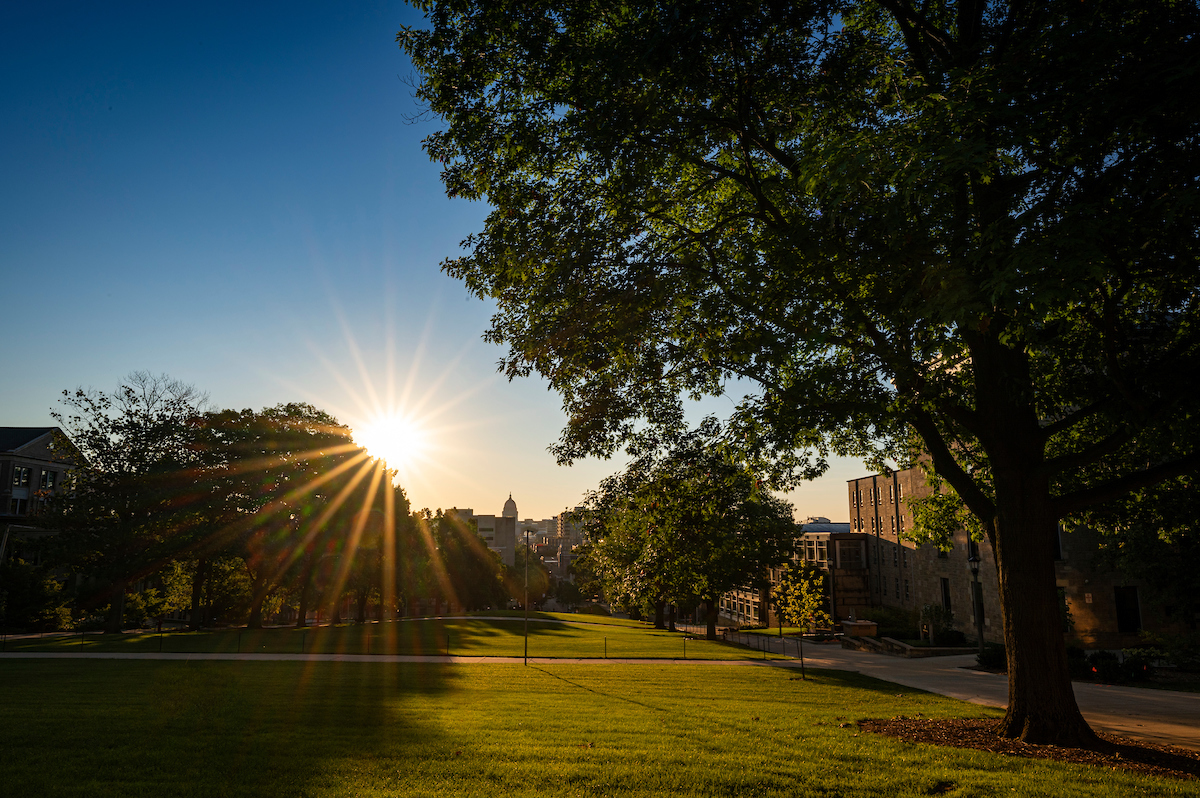RISE Initiative to focus on strategic faculty hiring to solve grand challenges

Through strategic additions of people and resources, RISE will build collaborative networks of faculty to tap high-priority research and development funding, make transformative discoveries with real-world impact, and equip students with the knowledge and skills to extend that impact into their careers. Photo: Bryce Richter
The new Wisconsin Research, Innovation and Scholarly Excellence (RISE) Initiative is designed to help address significant, complex challenges of particular importance to Wisconsin and the world, through accelerated and strategic faculty hiring, research infrastructure enhancement, interdisciplinary collaboration and increased student and educational opportunities.
“UW–Madison has always upheld its responsibility to innovate for the public good, a principle no less central to the university’s mission now than it was when the Wisconsin Idea was articulated nearly 120 years ago,” says Chancellor Jennifer L. Mnookin. “As the grand challenges of the 21st century come into focus, so do the opportunities for a university with UW–Madison’s breadth and depth to muster interdisciplinary research, education and action to rise and meet them. That is what the RISE Initiative is designed to do.”
RISE will choose focus areas anchored in fields in which UW–Madison has established, top-flight innovators and research centers. Through strategic additions of people and resources, RISE will build collaborative networks of faculty to tap high-priority research and development funding, make transformative discoveries with real-world impact, and equip students with the knowledge and skills to extend that impact into their careers.
“Problems aren’t confined to a single discipline, nor can the solutions be,” says Mnookin, who announced the initiative today in a presentation to the Board of Regents. “Audacious, interdisciplinary inquiry leading to groundbreaking discovery and education is what Wisconsin RISE is intended to spark.”
UW–Madison expects to recruit between 120 and 150 new faculty through the RISE Initiative over the next three to five years — reflecting, in addition to regular hiring, around a 40 percent increase in faculty hiring. According to Provost Charles Isbell, the strategically focused commitment of RISE will allow the university to accelerate the hiring of extraordinarily promising faculty and build on UW–Madison’s substantial existing strengths.
RISE will focus first on artificial intelligence. AI is most visible in the form of “generative AI” and large language models — algorithms that learn from oceans of data to approximate human communication and serve as the engine for chatbots like ChatGPT — and other AI models that perform similar computing tasks to create images.
“We have the opportunity to help society find success with AI by taking a holistic approach to computing and scientific challenges, understanding the human aspects, and by working to ensure our students appreciate its relevance to their lives and careers.”
Provost Charles Isbell
At a research institution like UW–Madison, AI is also opening new frontiers for scholars working in disciplines from agriculture to materials science to physics.
UW–Madison labs have already employed AI’s talent for making short work of the analysis of enormous volumes of data to improve the diagnosis of genetic disorders, head off the spread of crop disease, and predict new materials based on the properties that would be most useful. At the same time, UW–Madison computer scientists and communications and philosophy researchers are working to establish terms for human-AI interactions that ensure safe and ethical outcomes.
“Recognizing both the consequences of adopting this technology and its power to overcome problems to move us in new directions can be the distinction between those who succeed and those who don’t,” says Isbell, a computer sciences professor and leading AI researcher. “We have the opportunity to help society find success with AI by taking a holistic approach to computing and scientific challenges, understanding the human aspects, and by working to ensure our students appreciate its relevance to their lives and careers.”
Advancing AI with RISE Initiative support will put UW–Madison in a leadership position in a field with runaway growth and import on its own, while also expanding campus access to a tool that can boost almost any scholarly project.
“AI is such remarkable technology that it has been a priority for many of our departments for years,” says Ian Robertson, dean of the College of Engineering. “New, strategic additions can build that effort to a crescendo, leveraging the way fundamental AI research and diverse applications help each other to new heights.”
Research also serves as a foundation for the university’s educational mission, providing opportunities for students to put theory and skills from the classroom into practice and participate at the leading edge of the fields in which they are learning. RISE Initiative support for high-profile challenges strengthens those educational opportunities for undergraduate students, while making Wisconsin a more attractive destination for top graduate students.
“Some of today’s students will become tomorrow’s leading AI innovators, and all of today’s students need to learn to use AI-powered tools creatively, effectively and ethically,” Isbell says. “RISE AI is not just about research. By adding resources and focusing on this major challenge, we will naturally be able to carry the energy into the classroom.”
Future focus topics for RISE will be selected through cross-campus collaboration, with emphasis on fulfilling UW–Madison’s commitment to extending the reach of impactful new ideas, on drawing expertise from the wide range of academic disciplines on campus, and on potential for drawing valuable external support to a university that has already grown its research portfolio by an average of 8% annually over the last five years.
“By investing in exceptional faculty, researchers and a robust research infrastructure, UW–Madison will emerge as an even stronger global powerhouse, where cross-disciplinary research leads to groundbreaking new knowledge, transformative discoveries and impactful innovations that will address and help address major societal challenges for the betterment of Wisconsin and the world,” says Cynthia Czajkowski, interim vice chancellor for research.
For more information on the Wisconsin RISE Initiative, visit rise.wisc.edu.



